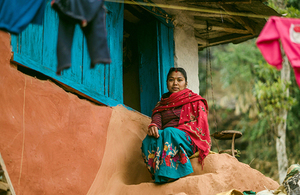UK aid to help stop violence against a million women and girls
The seven-year project across Africa, the Middle East and Asia will challenge endemic violent behaviour against women and girls.

- Programme to tackle violence against women and girls to be rolled out across Africa, Middle East and Asia after successful pilot scheme
- Seven-year programme, worth £67.5m, is biggest ever support package by a single donor country to tackle violence against women and girls
- Pilot scheme halved violence in some areas in just two years
A new UK aid programme will help stop violence against one million of the world’s poorest women and girls, the International Development Secretary Alok Sharma announced today.
The seven-year Department for International Development (DFID) project across Africa, the Middle East and Asia will challenge endemic violent behaviour against women and girls.
It will build on a successful pilot, which halved the levels of physical and sexual violence committed by men against their partners in some communities, including in Tajikistan, Ghana and the Democratic Republic of Congo (DRC). In Ghana, for example, women in participating villages reported a 55 per cent drop in violence by their sexual partner over 18 months.
Projects included using group sessions with men and women to directly address the reasons why male partners were violent, giving women the skills to become more economically independent, and training faith leaders to challenge violence against women in their sermons, prayer groups and youth groups.
But the challenge remains high in many communities in developing countries. For example, 64% of women asked in a survey in Zambia had been sexually assaulted by their partner and 33% had been kicked, dragged, choked or burnt.
The new £67.5 million programme will work in more countries and expand previously successful projects to help even more women at risk.
It is the biggest ever investment by a single donor government on programming and research to prevent violence against women and girls globally.
International Development Secretary Alok Sharma said:
Violence against women and girls affects communities around the world and one in every three women will experience it in their lifetime. It is an issue we must continue to tackle in both developing and developed countries.
However, for women and girls living in extreme poverty the threat is even higher. Failure to address this issue is not an option and doing nothing condemns future generations to repeat this cycle of violence.
This new support will make the lives of one million of the world’s poorest and most vulnerable women and girls safer – and help create a future where their daughters and granddaughters can live without fear.
As well as expanding the successful pilots, the new programme, What Works to Prevent Violence: Impact at Scale, will support new projects with a focus on:
- Communities hit by conflict and crisis. The risk of domestic violence rises during conflicts.
- Reaching women and girls most at risk, including those with disabilities and adolescent girls
- Addressing violence against children to stop violence passing from one generation to the next
As well as supporting projects on the ground, UK aid will also carry out research to determine which methods best stop violence against women and girls.
It follows DFID’s pioneering ‘What Works’ pilot scheme, which ran small-scale projects in 13 countries around the world, gathering evidence on what works to stop such violence.
Before this, there was little evidence internationally on how to tackle this issue, particularly in low and middle-income countries.
General media queries (24 hours)
Email mediateam@dfid.gov.uk
Telephone 020 7023 0600
If you have an urgent media query, please email the DFID Media Team on mediateam@dfid.gov.uk in the first instance and we will respond as soon as possible.